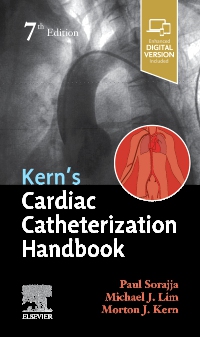
Kern's Cardiac Catheterization Handbook, 7th Edition
Paperback

-
- Provides clear instructions on what to expect, what to avoid, and how to manage complications for every procedure you’ll encounter – including coverage of new techniques and technologies that affect virtually all aspects of familiar procedures
- Covers all the newest catheterization techniques for vascular closure and expansion of large-bore access procedures, including TAVR, ECMO, mitraclip, and TMVR
- Features a new chapter on intracardiac echocardiography and intraprocedural imaging
- Discusses key topics such as intra-procedural imaging, management of complications with algorithms that expedite the approach to these patients, adjunctive hemodynamic support, and maintaining quality in the laboratory
- Incorporates an increased emphasis on indications and contraindications for procedures in the context of a multidisciplinary heart team approach
- Includes numerous clear illustrations to enhance your understanding of the material, as well as videos of Dr. Kern demonstrating various procedures in the cath lab
- Enhanced eBook version included with purchase. Your enhanced eBook allows you to access all of the text, figures, and references from the book on a variety of devices
-
Section I: Mitral disease
Transcatheter repair
1. Uncomplicated transcatheter mitral valve repair with MitraClip
2. Commissural mitral regurgitation therapy
3. Advanced steering in the left atrium for an aortic hugger
4. Transcatheter repair of ruptured papillary muscle
5. Optimal intraprocedural guidance for mitral therapy
6. Challenges of transcatheter therapy for functional mitral regurgitation
7. The zip-and-clip technique in transcatheter mitral valve repair
8. Mitral annular calcification and transcatheter mitral valve repair
9. Optimization for multiple clip placement
10. Importance of hemodynamics for assessing residual regurgitation
11. Use of low profile pressure wire for simultaneous left atrial pressure during repair
12. Barlow's valve therapy
13. Transcatheter mitral repair for cardiogenic shock
14. A space too small for additional clipping
15. Treatment of leaflet perforation with vascular plugs
16. Occluder therapy for residual mitral regurgitation after transcatheter repair
17. Clip-to-annuloplasty ring
18. Transcatheter repair of severe mitral regurgitation after surgical annuloplasty
19. Unsuccessful transcatheter repair after prior cardiac surgery
20. MitraClip in a patient with radiation heart disease
21. A difficult case of transcatheter mitral valve repair
22. Stuck on the atrial septum
23. Ensuring mitral leaflet insertion
24. One of my most difficult transcatheter repair cases
25. Single leaflet device attachment and clip embolization
26. Lessons learned from a difficult MitraClip case
27. Percutaneous treatment of ventricular dysfunction and secondary mitral regurgitation (Accucinch)
28. Percutaneous annuloplasty for severe mitral regurgitation (MitraAlign)
29. Left ventricular therapy for mitral regurgitation (Myocor)
30. Coronary sinus approach for mitral regurgitation (Carillon)
31. Plugging a hole near a mitral surgical ring
32. Anatomical intelligence and image fusion for image guidance of transcatheter mitral valve repair
Valve replacement
33. Computed tomography imaging for transcatheter mitral replacement
34. Retrograde transcatheter mitral valve replacement for mitral regurgitation (Twelve)
35. Retrograde transcatheter mitral valve replacement for mitral regurgitation (Tendyne)
36. Retrograde transcatheter mitral valve replacement for mitral regurgitation (Tiara)
37. Antegrade valve replacement in severe mitral annular calcification
38. Self expanding prosthesis for severe mitral annular calcification
39. Retrograde valve replacement in severe mitral annular calcification with a rail
40. Management of LVOT obstruction from mitral valve replacement
41. Transcatheter valve placement in a mitral ring
Balloon commissurotomy
42. Hemodynamic assessment of mitral disease
43. Balloon mitral valvuloplasty for rheumatic mitral stenosis
44. Rupture of mitral valve with balloon mitral valvuloplasty
45. The banking technique for Inoue balloon movement
Section II Aortic valve disease
Valve replacement
46. Caseous mitral annular calcification distorting the aortic annulus
47. Transfemoral balloon-expandable transcatheter aortic valve replacement (Sapien 3)
48. Double Valve Transcatheter Therapy for Mitral and Aortic Stenosis
49. Transvenous antegrade transcatheter aortic valve replacement
50. Valve embolization in transcatheter aortic valve replacement
51. Transcatheter aortic valve therapy for ascending aortic dissection with aortic regurgitation
52. Superior placement to overcome severe left ventricular outflow tract calcification
53. Retrieval of transaortic sheath marker loss
54. Left ventricular perforation during transcatheter aortic valve replacement
55. Subaortic ring therapy
56. Bicuspid aortic valve therapy - transcatheter challenges
57. Transcatheter aortic valve-in-valve therapy with high risk of coronary obstruction
58. A difficult case of transcatheter aortic valve replacement
59. Valve embolization during transcatheter aortic therapy
60. Transcaval transcatheter aortic valve replacement
61. Subclavian management during transcatheter aortic valve replacement
62. Rapid ventricular pacing and demise of left ventricular function
63. Pure aortic regurgitation treatment
64. Aortic regurgitation treatment in the presence of a left ventricular assist device
65. Prosthetic valve thrombosis
66. Fractures and twists during transcatheter aortic valve implantation
67. Transcatheter aortic valve therapy without pre-procedural computed tomography
Section III Prosthetic valve
Paravalvular regurgitation
68. Computed tomography for paravalvular leak closure
69. Retrograde repair of aortic paravalvular regurgitation
70. Retrograde repair of mitral paravalvular regurgitation
71. Retrograde Repair of a Multi-Orifice Mitral Paravalvular Leak by Hopscotch Technique
72. Antegrade repair of mitral paravalvular regurgitation
73. Benefit of accurate transseptal puncture in paravalvular closure
74. Challenging echocardiographic imaging for leak closure
75. Coronary dissection from paravalvular leak closure
76. Treatment of Coronary Obstruction after Paravalvular Leak Closure
77. Papillary muscle rupture during paravalvular leak closure
78. Step up technique with coronary guidewire use for paravalvular leak closure
79. The anchor wire technique for aortic paravalvular leak closure
80. Venous-arterial rail and anchor
81. Simultaneous plug placement for paravalvular leaks
82. Closure of aorta to right ventricle fistula
83. The aortic-arterial rail technique
84. Repair of paravalvular regurgitation in a balloon-expanding prosthesis
Valve-in-valve
85. Mitral valve-in-valve therapy with an apical rail
86. Antegrade mitral valve-in-valve therapy
87. Bioprosthetic valve fracture at the time of valve-in-valve TAVR
88. Self-expanding prosthesis for aortic valve-in-valve
89. Small prosthesis therapy
90. Transcatheter valve-in-valve therapy for tricuspid disease
91. Complex self-expanding aortic valve therapy
92. A very difficult case of valve-in-valve therapy
93. Antegrade balloon-expandable valve for tricuspid valve-in-valve therapy
94. Complex tricuspid valve-in-valve therapy


 as described in our
as described in our 